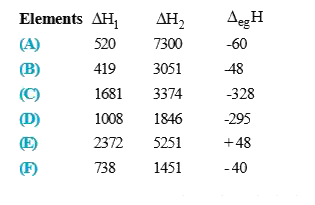Among the elements of the third period (Na to Ar), pick out the element
that is the most reactive metal.
To determine the most reactive metal among the elements of the third period (from Sodium to Argon), we can follow these steps:
Step 1: Identify the Elements in the Third Period
The elements in the third period of the periodic table are:
- Sodium (Na)
- Magnesium (Mg)
- Aluminum (Al)
- Silicon (Si)
- Phosphorus (P)
- Sulfur (S)
- Chlorine (Cl)
- Argon (Ar)
Step 2: Understand Reactivity of Metals
Reactivity of metals generally increases as we move down a group in the periodic table, but decreases as we move across a period from left to right. This is due to the increase in ionization energy and decrease in atomic size across a period. Metals tend to lose electrons to form cations, and those that can lose electrons more easily are considered more reactive.
Step 3: Compare the Metals in the Third Period
Among the elements listed, the metals are Sodium (Na), Magnesium (Mg), and Aluminum (Al). We need to consider their ability to lose electrons:
- Sodium (Na) has one electron in its outermost shell (3s¹).
- Magnesium (Mg) has two electrons in its outermost shell (3s²).
- Aluminum (Al) has three electrons in its outermost shell (3s² 3p¹).
Step 4: Analyze Ionization Energies
- Sodium has the lowest ionization energy among these three metals, which means it can lose its outermost electron more easily than Magnesium and Aluminum.
- As we move from Sodium to Aluminum, the ionization energy increases, making it harder for these elements to lose their outermost electrons.
Step 5: Conclusion
Since Sodium has the lowest ionization energy and can easily lose its single valence electron to form a cation (Na⁺), it is the most reactive metal in the third period.
Final Answer
The most reactive metal among the elements of the third period (Na to Ar) is Sodium (Na).
---
The elements in the third period of the periodic table are:
- Sodium (Na)
- Magnesium (Mg)
- Aluminum (Al)
- Silicon (Si)
- Phosphorus (P)
- Sulfur (S)
- Chlorine (Cl)
- Argon (Ar)
Reactivity of metals generally increases as we move down a group in the periodic table, but decreases as we move across a period from left to right. This is due to the increase in ionization energy and decrease in atomic size across a period. Metals tend to lose electrons to form cations, and those that can lose electrons more easily are considered more reactive.
Among the elements listed, the metals are Sodium (Na), Magnesium (Mg), and Aluminum (Al). We need to consider their ability to lose electrons:
- Sodium (Na) has one electron in its outermost shell (3s¹).
- Magnesium (Mg) has two electrons in its outermost shell (3s²).
- Aluminum (Al) has three electrons in its outermost shell (3s² 3p¹).
- Sodium has the lowest ionization energy among these three metals, which means it can lose its outermost electron more easily than Magnesium and Aluminum.
- As we move from Sodium to Aluminum, the ionization energy increases, making it harder for these elements to lose their outermost electrons.
Since Sodium has the lowest ionization energy and can easily lose its single valence electron to form a cation (Na⁺), it is the most reactive metal in the third period.
The most reactive metal among the elements of the third period (Na to Ar) is Sodium (Na).
Topper's Solved these Questions
- BOOK - VMC MODULES ENGLISHCHAPTER - PERIODIC PROPERTIES OF ELEMENTS EXERCISE - Practice Exercise29videos
PERIODIC PROPERTIES OF ELEMENTS
- BOOK - VMC MODULES ENGLISHCHAPTER - PERIODIC PROPERTIES OF ELEMENTS EXERCISE - In Chapter Exercise-A20videos
PERIODIC PROPERTIES OF ELEMENTS
- BOOK - VMC MODULES ENGLISHCHAPTER - PERIODIC PROPERTIES OF ELEMENTS EXERCISE - In Chapter Exercise-F20videos
PERIODIC PROPERTIES OF ELEMENTS
- BOOK - VMC MODULES ENGLISHCHAPTER - QUIZEXERCISE - Chemistry15videos
QUIZ
Similar Questions
Among the elements of the third period (Na to Ar), pick out the element
that is the most reactive non metal.View SolutionAmong the elements of the third period (Na to Ar), pick out the element
with the largest atomic radius.View SolutionAmong the elements of the third period (Na to Ar), pick out the element
with the highest first ionization enthalpy.View SolutionAmong the elements of second period pick out the element
that is the most reactive non- metal.View SolutionAmong the elements of second period pick out the element
that is the most reactive metal.View SolutionAll elements in the third period have
View SolutionAmong the elements of second period pick out the element
with the most negative electron gain enthalpyView SolutionAmong the elements of second period pick out the element
with the most negative electron gain enthalpyView SolutionAmong the elements of second period pick out the element
with the largest atomic radius.View SolutionThe first and second ionization enthalpies and electron gain enthalpy of some elements are as given below:

Which of these elements is the most reactive metal?View Solution

